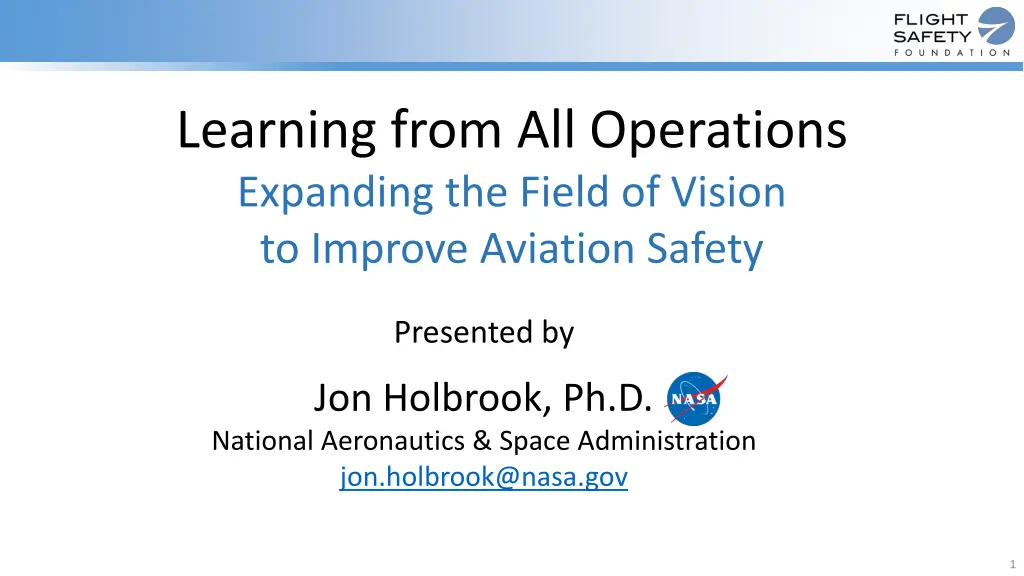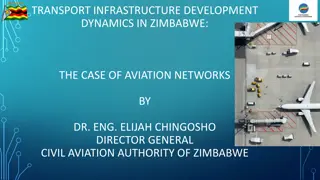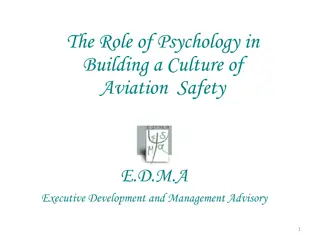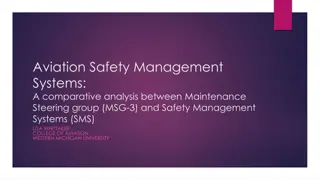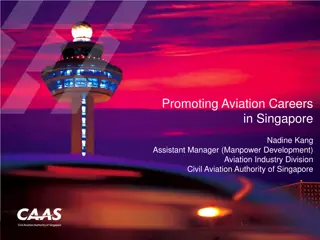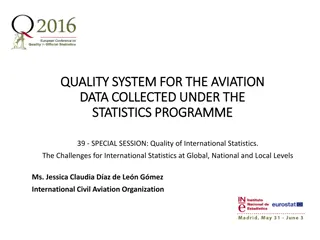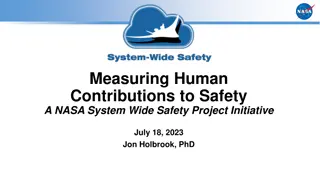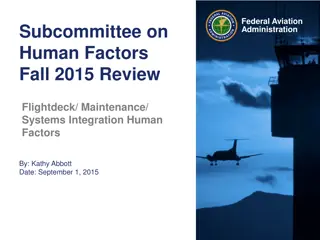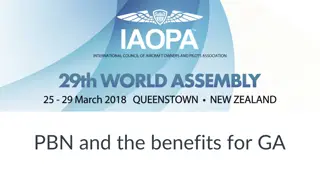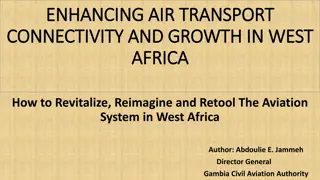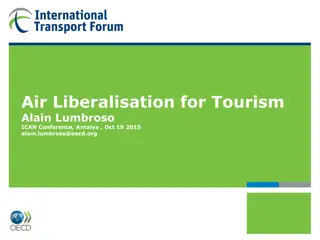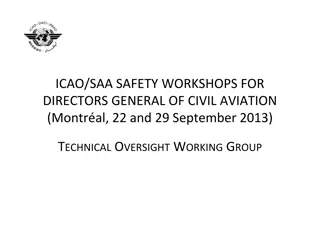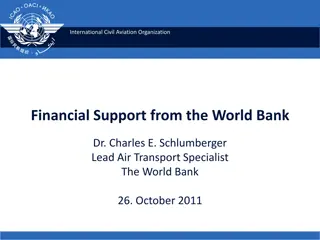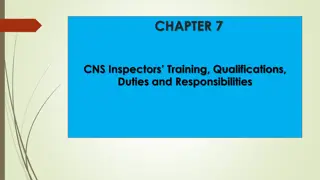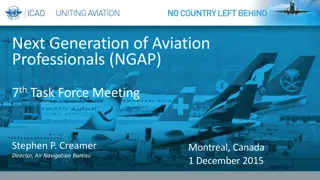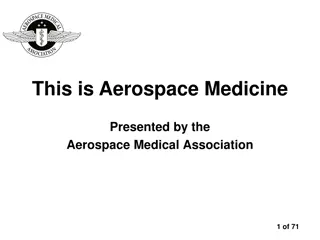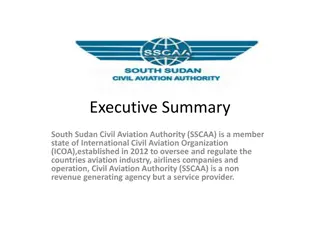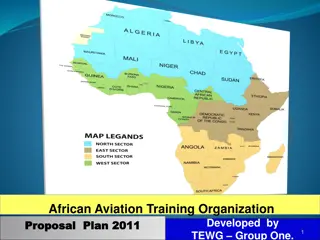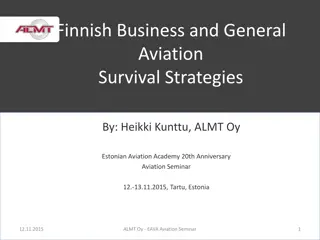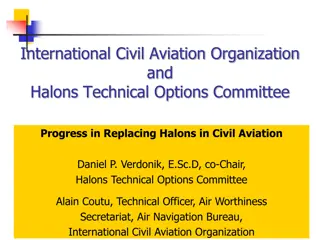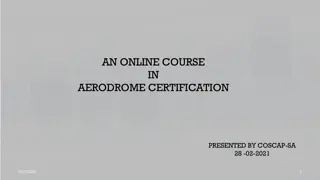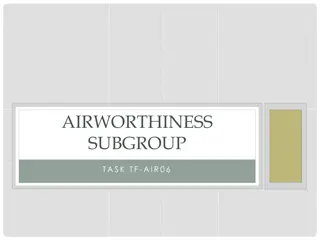Enhancing Aviation Safety Through Broadened Operational Insights
Explore innovative strategies to enhance aviation safety through a widened scope of operational perspectives. Gain insights from expert Dr. Jon Holbrook of NASA on expanding the field of vision in aviation. Popular
Download Presentation

Please find below an Image/Link to download the presentation.
The content on the website is provided AS IS for your information and personal use only. It may not be sold, licensed, or shared on other websites without obtaining consent from the author. Download presentation by click this link. If you encounter any issues during the download, it is possible that the publisher has removed the file from their server.
E N D
Presentation Transcript
Learning from All Operations Expanding the Field of Vision to Improve Aviation Safety Presented by Jon Holbrook, Ph.D. National Aeronautics & Space Administration jon.holbrook@nasa.gov 1
Acknowledgements Acknowledgements Initiative coordinator: Tzvetomir Blajev, FSF Director, Europe and Global Operational Safety First draft authors: Professor Erik Hollnagel, Dr. Steven Shorrock, Adam Johns Editing lead: Dr. Jon Holbrook, NASA Learning from All Operations Working Group contributors Captain James Kwasny, American Airlines Captain Nick Peterson, American Airlines Captain James Burnell, BALPA Joji Waites, BALPA James Norman, University of North Dakota Kentaro Kumeuchi, All Nippon Airways Valerie Stait, Cathay Pacific Airways Tom Laursen, IFATCA Captain Nicolaus Dmoch, NetJets Captain Harry Nelson, FSF IAC Alfred Vlasek, IFATCA Captain Max Butter, Lufthansa Captain George Hodgson, Southwest Airlines Captain Tom Becker, TUI Fly Captain Peter Malady, EasyJet Captain Hideaki Miyachi, Japan Airlines Sonnie Bates, WYVERN Ltd Dr. William Bramble, NTSB Captain David Lawrence, NTSB Christine Jefferies, The Ohio State University Asher Balkin, The Ohio State University Jean-Jacques Speyer, FSF EAC 2
A Call to Action: Improving Safety by Learning from All Operations A Call to Action: Improving Safety by Learning from All Operations We describe a safety mindset that Expands our understanding of what constitutes a safety-relevant event Improves our ability to learn from everyday work We endeavor to transform organizations focused on knowing about safety into organizations focused on learning about safety We encourage accountable safety professionals to integrate Learning From All Operations into existing safety programs To assist in that effort, we offer Practical suggestions Specific examples Lessons learned 3
Cultivating a Culture of Continuous Learning Cultivating a Culture of Continuous Learning Learning only from rare events means that learning only occurs rarely Continuous learning requires learning from everyday work, not just exceptional work Continuous learning expands our opportunities to collect, analyze and act upon safety- critical insights # of events Undesired events Performance 4
Identifying What Constitutes a Safety Identifying What Constitutes a Safety- -Relevant Event Relevant Event (1) Nearly all work activities end well Work that precedes both successful and failed outcomes often occurs in much the same way Continuous learning requires learning from what goes well, not just what fails Routine operation Distance from (2) Early Safety Limit intervention (3) (4) Near Miss; Close Call Accident (loss, harm) Typical Criterion for Safety Analysis Time 5
Benefits of Learning from All Operations Benefits of Learning from All Operations Learning from everyday work Does not have to wait Builds on what is already strong Helps organizations recognize slow changes Helps organizations respond before unwanted events occur Helps organizations understand the adaptations personnel make to keep the system operating Can involve everyone 6
Implementing Learning from All Operations Implementing Learning from All Operations Continuous learning does not require wholesale replacement of processes, practices, & tools Build upon or complement existing approaches to collect, analyze, manage, & disseminate safety data Observations of work Event investigation Surveys & audits Expanded use of system data To change conversations about safety, align the language used to talk about safety and the language used to talk about operational goals 7
Illustration: Changing the Conversation about Safety Illustration: Changing the Conversation about Safety by changing the language used to talk about safety Language can hinder or facilitate the ability of an organization to learn from events and create a safer working environment EUROCONTROL neutralized its incident taxonomy Many terms in its incident taxonomy included negative adjectives that restricted its utility to only unwanted events A simple change was made to remove the negative modifiers so the same taxonomy could be used to learn from what happens, not just what fails Learn more: Vesel, C. (2020), Agentive Language in Accident Investigation: Why Language Matters in Learning from Events, ACS Chem. Health Saf., 27, 1, 34 39. Patriarca et al. (2018). Managing safety data: the TOKAI experience for the Air Navigation Service Providers. Proceedings of the International Conference on Air Transport INAIR 2018. 8
Illustration: Observations of Work Illustration: Observations of Work American Airlines developed a different knowledge framework to provide new insights from flight observations. Line Operations Safety Audit Observation of everyday work Conducted by trained observer who is also a domain expert Focus on threats and errors How are they managed? How are they linked to undesired states? Learning & Improvement Teams Observation of everyday work Conducted by trained observer who is also a domain expert Focus on resilient performance How is (expected and unexpected) variability successfully managed? Learn more: International Civil Aviation Organization (2002). Line operations safety audit (LOSA), Doc 9803, AN/761, Montreal: ICAO. American Airlines Department of Flight Safety (2021). Charting a New Approach: What Goes Well and Why at American Airlines, A white paper outlining the second phase of AA s Learning and Improvement Team (LIT). 9
Illustration: Event Investigation Illustration: Event Investigation Cathay Pacific s Flight Operations team introduced the Operational Learning Review in collaboration with the corporate safety team to replace the traditional investigation process. Designed to follow up on an air safety report Seeks to learn what happened in an objective, judgment-free manner, regardless of the outcome or its severity Establishes the local rationale of the pilots involved from their perspective Why their actions made sense to them at the time Encourages identification of positive pilot performance in every event 10
Illustration: Surveys & Audits Illustration: Surveys & Audits Deutsche Flugsicherung (DFS) transformed the role of its auditors to surveyors. Developed local safety surveys Workshops with operational and non-operational staff and management to get a picture of daily routines and why rules and norms may not always fit Rather than addressing deviations, goal is to understand work and why rules are sometimes interpreted differently Learn more: Gontar, P. & J. Kurth, P. (2020). Local safety surveys: From auditing to understanding. HindSight, 31, Winter. Brussels: EUROCONTROL. https://www.skybrary.aero/bookshelf/books/5922.pdf 11
Illustration: Expanded Use of System Data Illustration: Expanded Use of System Data Lufthansa used distributions of everyday operational data to address specific operational safety issues. Analyses of digital surveillance and flight operations quality assurance data have been historically focused on exceedance events Purpose of new analyses was to learn from flights which result in a safe outcome to identify lessons to improve flights with exceedances By focusing on the distributions of the everyday operational data, a clearer picture of the overall operation could be achieved Led to further improvements in different aspects of aviation safety within the airline Safer landing technique (e.g., landing overrun protection, prevention of hard landings) Improved handling of traffic collision avoidance system (TCAS) events Better handling of turbulence encounters Safer takeoff rotation 12
Integrating Learning from All Operations into Safety Management Integrating Learning from All Operations into Safety Management Safety management should serve to ensure steady functioning by focusing on management for safety rather than on management of safety Promoting a proactive rather than defensive approach to safety Document and analyze how operations are performed Identify performance outcomes, including positive outcomes Identify how personnel have come to perform operations this way Are there organizational operating norms? Are they documented? What are the benefits of the way the operations are performed and what are the potential weaknesses? What can be done to strengthen benefits and prepare for the weaknesses? What other operations are performed in the same or similar way? 13
Conclusion & Next Steps Conclusion & Next Steps Described a safety mindset that expands our understanding of what constitutes a safety-relevant occurrence and improves our ability to learn from everyday work Call to action for managers and executives who are accountable for safety in their organizations to build upon the ideas, lessons and examples presented and apply them within their organizations Flight Safety Foundation campaign to promote the global practices of the Learning from All Operations concept & methods Establish a dedicated global community and network for exchange of Learning from All Operations ideas and best practices Promote Learning from All Operations implementation through workshops and symposiums Support Learning from All Operations knowledge generation through dedicated studies and aggregation of exchanged ideas and best practices Facilitate Learning from All Operations knowledge organization, accessibility, and promotion, through publications, toolkits and training 14
Thank you! POC for the FSF Learning from All Operation initiative: Tzvetomir Blajev (blajev@flightsafety.org) The full FSF white paper can be found online at: https://flightsafety.org/wp-content/uploads/2021/07/Learning-from-All- Operations-FINAL.pdf 15
